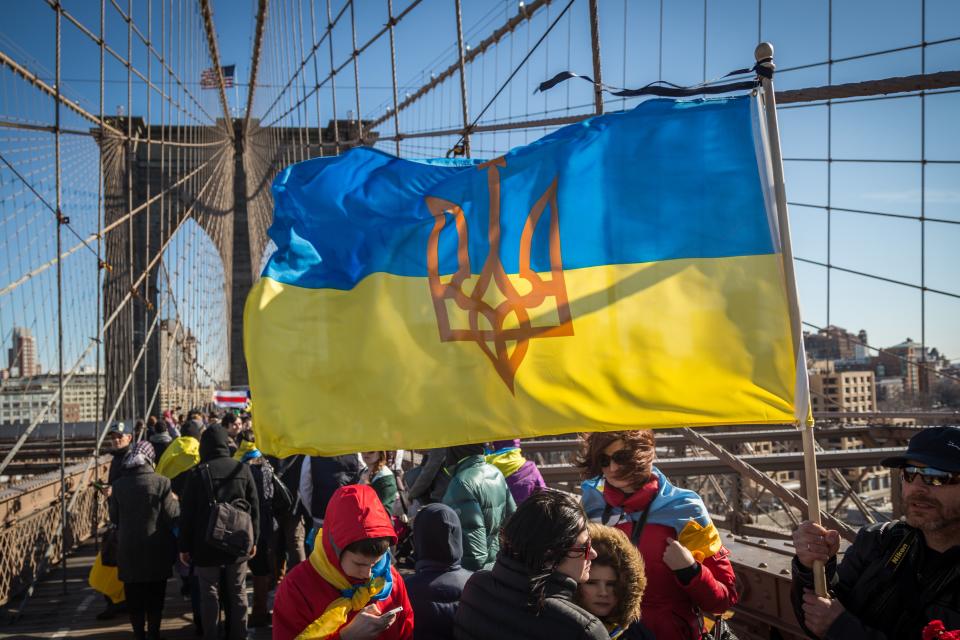Diplomat Bill Taylor Drops Bombshell in First Public Impeachment Hearing
On Wednesday morning, acting U.S. ambassador to Ukraine Bill Taylor became one of the first witnesses to testify publicly in the impeachment inquiry of Donald Trump. His opening statement included a legitimate bombshell that closely links Trump to the administration's clandestine efforts to extort the government of Ukraine—and undermines more than one of the Republicans' favorite talking points in their defenses of the president.
Taylor has been a key figure in the Ukraine scandal since early October, when lawmakers released text messages between him, a nonpartisan career diplomat, and Gordon Sondland, a Trump donor-turned-ambassador. "I think it's crazy to withhold security assistance for help with a political campaign," Taylor wrote to Sondland on September 9, after learning from Sondland that the administration had made U.S. military aid and Ukrainian president Volodymyr Zelensky's White House invite contingent on acquiescence with Trump's demand. In response, Sondland told Taylor that this was not part of any illicit quid pro quo—even though it was a textbook example of an illicit quid pro quo. Sondland also conspicuously suggested that he and Taylor not exchange any further text messages on the subject.
These revelations painted a damning picture of Trump as a president casually hijacking the tools of American diplomacy to serve his political interests. What Taylor's earlier account did not include, however, was personal knowledge that Trump himself explicitly directed and endorsed the cash-for-services transaction Sondland championed. For the most part, the details he shared about Trump's statements and state of mind came from his recollections of conversations with Sondland and former special envoy to Ukraine Kurt Volker, who spoke directly with the president; they did not come from the president himself.
Of course, Taylor need not have been present for every step of a crime in order to provide useful information about the crime's commission. Nonetheless, as part of an effort to discredit Taylor, Republican politicians and apparatchiks have harped on this alleged deficiency ever since. On the day of Taylor's closed-door testimony, North Carolina congressman Mark Meadows claimed that the "hearsay allegations didn't hold up against any real scrutiny." White House press secretary Stephanie Grisham, meanwhile, referred to Taylor's account as an even-less-credible bit of "triple hearsay," and dismissed the entire affair as "a coordinated smear campaign from far-left lawmakers and radical unelected bureaucrats waging war on the Constitution."
This portion of Sondland's opening statement on Wednesday, which was not a part of his October written statement, goes a long way towards rendering this degrees-of-separation argument moot.

The day after the infamous Trump-Zelensky phone call—the one in which Trump asked Zelensky to do him a "favor"—a member of Taylor's staff overheard Trump asking Sondland about the status of the "investigations." Then Sondland replied that the Ukrainians were ready to "move forward." As if to clear up any ambiguity about what this exchange could have signified, a triumphant Sondland then told a State Department staffer that Trump "cares more about" these coerced dirt-gathering expeditions than he did about Ukraine itself. In other words, the scheme yielded exactly what the president wanted.
Later, Taylor continued to methodically shred some of the most common GOP defenses of Trump under questioning from Democratic impeachment counsel Daniel Goldman. In a memorandum released yesterday, for example, House Republicans reiterated their positions that that the July 25 call summary "shows no conditionality or evidence of pressure," and that both Trump and Zelensky have stated publicly there was "no pressure on the call" since news of the scandal broke.

Given the obvious power imbalance between the two countries, the notion Trump was exonerated by the absence of a threat from the White House call notes was always absurd. When Trump asks something of Zelensky, and both men know that millions of dollars and a coveted diplomatic visit hang in the balance, Zelensky is under tremendous "pressure" even Trump doesn't make the consequences of noncompliance explicit. Taylor, though, refuted these bullet points in couple of sentences. "I know that the Ukrainians were very concerned about the security assistance, and I know that they were prepared or preparing to make a public statement," he said after Goldman asked if Ukraine "felt pressured" to announce a Biden probe on CNN. He also affirmed that by the time the July 25 call took place, Ukraine had been informed by someone in Trump's inner circle that if Zelensky wanted a White House meeting, he'd have to do what his counterpart asked.
Republican lawmakers in the hearing room spent their allotted time for speaking to push wild conspiracy theories, air their gripes about House Intelligence Committee chair Adam Schiff, and generally sow as much chaos as possible. Ohio congressman Jim Jordan tried to derail the proceedings by repeating dangerous right-wing calls to out the Ukraine whistleblower, as if that person's identity has any bearing on the testimony of Taylor and other government officials who have since corroborated the substance of the whistleblower's complaint. California congressman Devin Nunes, the committee's ranking Republican, read from a bingo card of Fox News buzzwords during his opening remarks, blaming impeachment on a mysterious cabal of the "corrupt media," "partisan bureaucrats," and a collection of Justice Department, State Department, and FBI officials intent on undoing the results of the 2016 election.
This brief exchange, though, yielded perhaps the most succinct summary of the unprecedented presidential corruption to which Taylor testified, despite Republican protestations to the contrary. "In your decades of military service and diplomatic service representing the United States and the world," Goldman asked, "have you ever seen another example of foreign aid conditioned on the personal of political interests of the President of the United States?"
"No, Mr. Goldman," Taylor answered. "I have not."
Whether it’s Paul Manafort or Hunter Biden and Donald Trump, Ukraine seems to play a disproportionately popular role in our nation’s recent controversies. Julia Ioffe explains why the same small country is increasingly involved in America’s political chaos.
Originally Appeared on GQ


